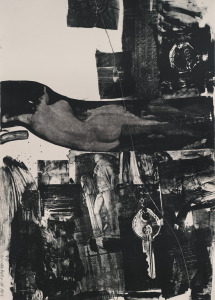Stray dog on the straw wind –
Heaven & earth are ruthless,
Yelp, yelp –
Where’s your tag, tab & chip!
You’re not even an exile,
You’re banned,
Perhaps you’ll get rabies & infect us.
This is my seat, my place, my corner,
I’m here, I’ve got my coat & bag
Next, see, when you get on,
I’m next to the window.
Get back to your kennel, with a number on.
Running loose. So we know where you are.
Maybe someone will leash you in.
Leash you from the lash.
Going to make it to the hill!
Borders are patrolled here.
A few chickens in the backyards
On the way. No way.
Our helicopter’s sniper
Will take you out & kill, kill, kill.
Poor thing, looks about all in,
What a shame, that beggar
Down the road looks as if he’d eat it.
I wouldn’t be surprised,
Poor thing.
What, sit here?
The bus is full?
Really, Oh well, if you must,
You must.
Mutter, utter,
(My Space:) ((so small)).
Here we are, at least, aren’t we.
Pets, but a stray’s a stray.
It’s raining cats & dogs.
Straw dog on the stray wind.
& treats the myriad creatures as straw dogs.
(Lao Tzu)

Robin Ouzman Hislop Editor of the 12 year running on line monthly poetry journal Poetry Life and Times. (See its Wikipedia entry at Poetry Life and Times). He has made many appearances over the last years in the quarterly journals Canadian Zen Haiku, including In the Spotlight Winter 2010 & Sonnetto Poesia. Previously published in international magazines, his recent publications include Voices without Borders Volume 1 (USA), Cold Mountain Review, Appalachian University N Carolina, Post Hoc installed at Bank Street Arts Centre, Sheffield (UK), Uroborus Journal, 2011-2012 (Sheffield, UK), The Poetic Bond II & 111, available at The Poetic Bond and Phoenix Rising from the Ashes a recently published Anthology of Sonnets: Phoenix Rising from the Ashes. He has recently completed a volume of poetry, The World at Large, for future publication. He is currently resident in Spain engaged in poetry translation projects.
robin@artvilla.com
PoetryLifeTimes
Poetry Life & Times
editor@artvilla.com
www.artvilla.com
Artvilla.com
Month: February 2015
B.W. (Before Wireless) A Poem by Joseph Farley
The cycles of the moon
have been with us
since man first crawled
out of the trees.
Staring up through branches
or from the grasslands
our ancestors saw
a common glow,
a friendly face.
Poets and travelers
were and are
never far from home
so long as that satellite
hovered above.
Though it sends
no messages on its own
we can bounce thoughts
off of it.
Some of those feelings
and ideas have surfaced
in like minds in every age
without the need
of a cell phone.
There is no signal tonight.
Do not wait for my call.
Just look out the window,
and know I am thinking of you.

Joseph Farley edited Axe Factory from 1986 to 2010. Farley writes poetry, fiction, plays and essays. He also performs with Improv on Rye. His books and chapbooks include Suckers, For the Birds, Longing for the Mother Tongue, Waltz of the Meatballs, Her Eyes, and Crow of Night. His work has appeared recently in Bellview Park Pages, Bewildering Tales, Beyond Imagination, BlazeVOX, Crack the Spine, Danse Macabre, Concrete Meat Sheets, Thunder Sandwich, Horror Sleaze Trash, Schlock, T. Gene Davis Speculative Blog, US 1 Worksheets, Verse Wisconsin, Visions and Voices, Whole Beast Rag, Ygdrasil, Literary Hatchet, and the anthologies One Hell of a Christmas, Thirteen O’Clock Press, 2014, and Night Walkers, Thirteen O’Clock Press, 2014.
robin@artvilla.com
PoetryLifeTimes
Poetry Life & Times
editor@artvilla.com
www.artvilla.com
Artvilla.com
Breakthrough 1. Ekphrastic Poem by Neil Ellman
(after the lithograph by Robert Rauschenberg)
Penetrate the impenetrable.
Permeate the impermeable.
Breach the unbreachable.
Pry open the tight-fist grip of time
and split the atom to its soul.
Break through to the other side
where stars, grown dark,
have left an empty space.
Puncture heaven itself
and insinuate your dreams
where none had ever been
then carve out a Zodiac with an image
of yourself
to lord it over the universe
as if you can.
Biography: Nominated for the Pushcart Prize and Best of the Net, Neil Ellman writes from New Jersey. More than 1000 of his poems, many of which are ekphrastic and written in response to works of modern and contemporary art, appear in print and online journals, anthologies and chapbooks throughout the world. His first full-length collection is Parallels: Selected Ekphrastic Poetry, 2009-2012 (Omphaloskeptic Press).
robin@artvilla.com
PoetryLifeTimes
Poetry Life & Times
editor@artvilla.com
www.artvilla.com
Artvilla.com
The Best Tlacoyos in Chickasawhatchee. A Poem by R.W. Haynes
Back before he was extinct, I mean, of course,
The Great Common-Sense Woodpecker, bless his heart,
You could sit here on the porch, sober as a judge,
And watch pterodactyls chasing the bugs
Back and forth around the glowing moon.
Back then, that is, before it all went to hell,
That boy from Bacon County, what was his name?
His daddy drove a log truck, it finally caught fire
And burned down the Primitive Baptist Church,
But the pastor’s German Shepherd barked in time,
And they saved the parsonage. I’ll remember his name,
The boy’s, not the German Shepherd’s, here in a little,
But anyhow, he played the mandolin, not the dog,
Of course, but the kid from Bacon, pretty well,
And he’d park his butt on the steps and play old songs,
“Pretty Polly,” “Darlin’ Corey,” and “Watch Out, Young Ladies,”
And Grandmama, who did watch out pretty well
When she was young, according to her, anyhow,
Would tap her foot as if arthritis was a song.
And up in the sky, the constellations danced,
And passenger pigeons flowed across forever,
And old songs fused together like aqueducts,
Washing all the grief away that any of us ever had.

R. W. Haynes has taught literature at Texas A&M International University since 1992. His recent interests include the early British sonnet, and he is completing a second book on the Texas playwright and screenwriter Horton Foote (1916-2009). In his poetry, Haynes seeks to celebrate life, liberty, and the pursuit of happiness without sounding any more dissonant notes than he has to. In fiction, he works toward grasping that part of the past which made its mark on his generation. He enjoys teaching drama, especially the Greeks, Ibsen, and Shakespeare, and he devoutly hopes for a stunning literary Renaissance in South Texas.
robin@artvilla.com
PoetryLifeTimes
Poetry Life & Times
editor@artvilla.com
www.artvilla.com
Artvilla.com
East of Eden. A Poem by Robin Ouzman Hislop
The killing machine kills more animals a day
for consumption
than ipso facto, we in a year’s killing fields.
God made in our image, the anonymous
crowd, knotted
through with confections washed up on
Our coast of humanity, which windows
onto a Zoo
life thrives on deception. A moral mind
An infallible judgement, where everyone
is dead
every tomb unearthed, then resealed
Animal, human remains heaped in fields
as tipped
dumps, where even the horizon’s clouds
Are vapid incineration, a house of cards
crumbling, falling
into one another, into the pit that blots us out.

Robin Ouzman Hislop Editor of the 12 year running on line monthly poetry journal Poetry Life and Times. (See its Wikipedia entry at Poetry Life and Times). He has made many appearances over the last years in the quarterly journals Canadian Zen Haiku, including In the Spotlight Winter 2010 & Sonnetto Poesia. Previously published in international magazines, his recent publications include Voices without Borders Volume 1 (USA), Cold Mountain Review, Appalachian University N Carolina, Post Hoc installed at Bank Street Arts Centre, Sheffield (UK), Uroborus Journal, 2011-2012 (Sheffield, UK), The Poetic Bond II & 111, available at The Poetic Bond and Phoenix Rising from the Ashes a recently published Anthology of Sonnets: Phoenix Rising from the Ashes. He has recently completed a volume of poetry, The World at Large, for future publication. He is currently resident in Spain engaged in poetry translation projects.
robin@artvilla.com
PoetryLifeTimes
Poetry Life & Times
editor@artvilla.com
www.artvilla.com
Artvilla.com
The Comfort of Strangers Arguing. A Video Poem by Paul A. Toth.
The_Comfort_of_Strangers_Arguing.avi.
For years
I’ve not dared
sleep in bed,
for there alone
through the window
a wind has whistled
in my ears,
and death’s next
of kin soon appears
to collect my arrears.
Since then, I’ve slept
in the living room,
prison and womb
and soon enough my tomb.
And if silent,
the night remained
the season of unreason
and conscience torn,
then a murderous treason
was expected
and nightly born.
In the day,
I never saw the neighbors,
not one, nor the sun,
whether rising or falling
or while passing above
the hours between.
Instead, I’d seen
the suggestion of light,
a blunted gleam.
Nevertheless, upstairs
there was one
friend, of sorts,
the last of my resorts,
disembodied, of course,
but at least
the occasional voice
of a beast.
One night, I thought
he’d found time
to pause and make a rhyme
and shouted it, too.
In the words of my neighbor:
“How could you waver,”
“one moment the mother of my child,
“the next sparing yourself
“the bother of your labor?”
But I had made his meaning mine
from words that had stalled
somewhere between the walls,
and as consonants raged,
I wrote another page
for a play I had completed
and too many times staged.
Even now,
the one, the other,
the girl on the phone,
is prone
to regretting her leaving
a dial tone
for his grieving.
When the telephone rings,
I await the sound
of mattress springs.
He never lasts long.
I know his usual song
will give him an angle
to escape his sense
that something within him is wrong.
Breaking the spell, he sings to the angel
he now thinks a witch: “If only I’d thrown
“a better bone to that bitch.”
He like, me, will recall his abuses
conducted out of sight
like cabooses.
How long the train of excuses.
How great the weight
of what lies behind,
burdens carried
in back of the mind,
for thousands of miles forgotten,
yet from the beginning, the cargo
already rotten.
Some time later, I pulled my train
of thought to a stop at the station,
for I was interrupted by revelation:
A neighbor’s words once mine,
anger spoken in another time,
to someone else long ago,
silenced, too, by dial tone,
the slamming of the phone,
shooting stars in my eyes,
a conspiracy
of regretting
I’d revealed to myself
so many times
that it now concealed
I was rotting by forgetting
all those miles
I’d carried
the weight of decades-ago
unloaded freight.
My next stop
was a candled cathedral,
and I returned to that place
where for years
something in me burned,
the suggestion of a darkness
that would never be turned,
as if I’d not learned
that for which I yearned
always returned, whereby
I was moved
close to perfection.
My endless confessions
rose from their knees
and demanded my secession
from nostalgia’s concessions
and regret’s intercessions.
With match, I set fire
to their airy alliance.
In defiance
I inhaled
the smoke of the past,
then exhaled my silence.
My bio: Paul A. Toth is the author of four novels, including his 9/11 based Airplane Novel (2011), noted by USA Today as the 4th Best Independent Novel of 2011. His latest is Let’s Go Shopping, The War Is Over, a collection of his best short stories. He is also the founder and publisher of Eye Am Eye Books
robin@artvilla.com
PoetryLifeTimes
Poetry Life & Times
editor@artvilla.com
www.artvilla.com
Artvilla.com
The Song of Makeda (Makeda, the Queen of Sheba’s reply to The Song of Solomon) A Poem by Sara L. Russell
Ch. 1.
1.
Behold, thou art dark and comely, my love;
richly hath the sun favoured thee,
delighting in thy presence.
Let me savour thy kisses of wine;
for in the gardens of the temple
the lotus furls open,
wild bees fall asleep on her face.
2.
Lilies and jasmine bloom
in the garden of my love;
falls of wisteria,
carpets of thyme.
Let us lie in the shade of the olives
to gaze on the sky.
3.
For many hours my love slept
beneath the cedars,
couched on cool swathes of linen,
like the Lord of Midnight enthroned on a cloud.
Long tresses of willows shivered to cool his face.
I called his name but he heard me not,
being entranced in slumber,
deep in the thrall of dreams;
therefore I shall let him awaken when he please.
Ch. 2.
4.
A warm breath of nard is my master, my king,
A great golden deity haloed with stars.
Behold, the noble bearing of a king,
the finely-wrought body of a man.
In my dearest dreams he standeth before me
out of my reach, gesturing for me to follow,
calling unto me like the very embodiment of love.
5.
Night comes softly, o daughters of Jerusalem,
My king’s desirous eyes have grown heavy with sleep.
His black hair ripples about his face
like curtains of smoke,
gold bracelets entice my gaze to
the sinews of his arms.
Like roses unfurling, so open the lips of my love,
I burn for their flavour,
yet awaken him not till he please.
Ch. 3.
6.
Out of the forest I came, with my
maidens and minions;
with carpets of hibiscus strewn at my feet.
Columns of frankincense curved into the air,
burning from lamps of copper and gold.
From the broad slopes of Edom
my soul’s love stopped to observe us.
I felt his warm gaze upon me,
so soft a look as touched like caresses of hands.
I am weary with desire, my lord and king,
Bring me the looks of thine eyes, dark as midnight,
That regard me with touches of silk.
7.
Though I may stand with my legion before thee,
an army behind me,
The west wind roars to my left,
the east to my right,
a million strong with all my banners, warriors
and standard-bearers,
still my delight were only to serve thee,
see how I tremble with awe by thy side.
8.
Behold, my ladies, the noble bearing of a king,
the finely-wrought body of a man.
My king is a custodian of the sanctity of love,
see those arms with the strength to smite
yet full of the will to embrace.
Nightly cometh he to my chambers,
whispering of love,
with the stealth of a lion,
as meek as a lamb.
Ch. 4.
9.
Preparing for my beloved,
I have put on my mantle of midnight sky
garlanded with stars.
My black locks are hung with beads of gold,
my neck is anointed with sandalwood and rose.
Come, my ladies,
Bring me my white chargers,
my sedan lined with silks from Lebanon,
my heralds and cavalcades of guards;
My beloved king awaits my pleasure.
10.
When I am in the embrace of my beloved,
He is worlds of landscapes of desire,
he is all the earth, air and sky to me.
His eyes shineth as my sun and moon,
his broad chest becometh as the
cool desert dunes by night,
where I may rest my head.
Go safely in thy dreams, beloved king,
with sentinel angels, to roost with the doves.
Ch. 5.
11.
Such a turmoil of a dream
hath troubled me, my sisters,
I dreamed that my love approached my window,
Calling unto me through the
rosewood trefoils of the lattice.
Forgetful of our tryst I answered him not,
all oils and fine trappings were put away,
mine eyes were full of slumber.
When finally I rose from my bed
he had gone.
12.
Overwrought and afraid,
I went out in the streets,
calling unto my beloved,
receiving no answer and calling again.
The night watchmen came and found me,
they smote me and denounced me as pagan,
calling me harlot and worshipper of false idols,
harshly they beat me with flails
and threw me into the darkest cellars
of the palace of Solomon.
13.
Awakening at last,
I felt a warm breeze,
It was my love’s breath upon my face.
Let all the world suspend in time,
let hate, rage and darkness flee as a shadow,
otherwise let me die here in the arms of my king.
There is but this one hour, one place,
in one lingering moment,
When my soul’s love and I are conjoined
in the petals of love.
Ch. 6.
14.
Midnight has fallen in the gardens
of the temple of Solomon.
The moon communes with her sister in the lake,
painting the magnolias with mother-of-pearl,
turning her buds into silver doves.
Passion and beauty intertwine in my love’s garden,
Like the twisted trunks of the fig trees of Judea.
Behold, my beloved,
thou art more comely even than the moon.
Come and walk with me
in the balmy air of night.
15.
Only through the love of another may
a soul come to know of itself.
My king is mine and I am his;
The sun and moon each taketh their
turn in the sky,
the shepherds go sure-footed
over their hills and valleys,
the merchants go their ways in the
spice markets of Lebanon,
while he and I are lost in one another’s eyes.
Ch. 7.
16.
Love’s weariness hath overcome me,
beloved lord and king.
Bring me thy pleasant fruits, thy tender words,
Lie betwixt my breasts; my hair shall
be thy curtain,
these arms shall be as thy cocoon.
Let the tides cease their turning
and the winds give pause to hold their breath.
Awaken not my dearest love, until he please.
17.
Even in sleep,
such beautiful eyes hath my beloved;
his eyelashes rest upon his cheek
like the feet of a butterfly on a lily.
Come, my sisters, we shall make him
a bed of hemp and poppies,
with fruit of the lotus,
that he may languish beside me
for many days and nights.
Ch. 8.
18.
Filling my days and dreams,
here is a man with the grace of a young hart,
whose honeyed voice speaketh mantras of desire.
Arise and follow me, beloved, for my vineyards
are ripe with luscious fruits,
the doves beat their wings and fly from the cots.
Emerging from the amber of sunrise,
with a swirling of veils,
summer dances into the season of our love.
19.
Lying amid the twisting vines
My love and I are deep in each other’s embrace
and his lips taste of roses heavy with dew.
I am a queen of the Red Sea,
an orchid from a sacred garden,
and my kingdom reacheth to the farthest hills.
None but my love shall pass the boundary
where my vines bear the sweetest fruit,
nor taste their heady wine.
20.
The gates of my vineyard are wrought of
iron clad with gold,
taller than cedars, decorated with
the royal insignia,
guarded by three score watchmen,
by day and night.
While other men are kept without
and the foxes are driven back by dogs,
see how swiftly they open for thee.
Ch. 9.
21.
Behold, the noble stature of a king,
the finely-wrought body of a man.
In the sanctity of love
we may walk in the realm of paradise,
undisturbed by the foibles of men.
Come beloved, awaken,
the new dawn opens as wide and fresh
as infant eyes.
Come run with me through the spice hills
and gardens of Lebanon.

Sara Louise Russell, aka PinkyAndrexa, is a UK poet and poetry ezine editor, specialising particularly in sonnets, lyric-style poetry and occasionally writing in more modern styles. She founded Poetry Life & Times and edited it from 1998 to 2006, when she handed it over to Robin Ouzman Hislop and Amparo Arrospide; Robin now runs it as Editor from Poetry Life & Times. She is currently founder and Editor of the daily paper.li journal, Poetry Lifetimes ; which is a sister publication to Poetry Life & Times. Her poems and sonnets have been published in many paper and online publications including Sonnetto Poesia, Mindful of Poetry and Autumn Leaves a monthly Poetry ezine from the late Sondra Ball. Her sonnets also currently appear in the recently published anthology of sonnets Phoenix Rising from the Ashes. She is also one of the first poets ever to be published on multimedia CD ROMs, published by Kedco Studios Inc.; the first one being “Pinky’s Little Book of Shadows”, which was featured by the UK’s national newspaper The Daily Mirror, in October 1999. (Picture link for Mirror article)Angel Fire
robin@artvilla.com
PoetryLifeTimes
Poetry Life & Times
editor@artvilla.com
www.artvilla.com
Artvilla.com
TRIUMPH OF ARTEMIS OVER VOLUPTA . A Poem by Ana Rossetti. Translated by Robin Ouzman Hislop & Amparo Arrospide
This work comprises in an excerpt from the anthology on contemporary Spanish female poets entitled Las Diosas Blancas. Madrid, 1985. Copyright Ed. Ramon Buenaventura. Hiperion. This is an original and unpublished English version of the original poem written in Spanish. Translators Robin Ouzman Hislop and Amparo Arrospide would like to thank Casa del Traductor, in Tarazona and the British Literary Translation Association, East Anglia University Campus.
From this Spanish anthology –compiled by the well-known scholar and translator Mr. Ramón Buenaventura, whom we contacted earlier– a few selected authors were chosen for our joint translation work: Amalia Iglesias: Te buscare para decirte (I Will Find You To Tell You) , Ana Rossetti: Triunfo de Artemis sobre Volupta (Triumph Of Artemis Over Volupta) and Isolda (Isolda) , Blanca Andreu: Para Olga (For Olga) , Isla Correyero: Los Pajaros (Small Birds), Amparo Amoros: Midas (Midas) and Criaturas del gozo (Creatures Of Joy) , Rosalia Vallejo: Horno en llamarada (A Furnace In Flames) , Maria del Carmen Pallares: Sisargas (Sisargas), Margarita Arroyo: Era el mar lejos del mar ( It Was Sea Away From Sea).
We would like to thank Mr. Ramón Buenaventura and the above name poets, in advance, and let them rest assured that their work is protected by a legal Creative Commons Licence, by virtue of which the above named translators are willing to provide excerpts from their original translation work, provided that readers agree to use it under the terms of such licence. We strongly recommend reading the entire work and the poets’, who have continued evolving during these decades.
I question in your mirror, inimitable age,
in which of my innumerable
larders is the mask of the goddess,
which once shadow covered marbles.
Your ardor, such obsessive ecstasy,
made her lovely and distant and proclaimed her alone.
Not with standing the times she abused you all!
Her tongue so cruel was as a whip lash.
Behind the balconies she spied eagerly
denying supplicant eyes
if any of your desires were presumptive.
She granted none of you a single thread of her tunic,
not even as much as to stir its beads.
None of you were able to peep through a keyhole
to see how parsimoniously she disrobed herself
letting her nakedness grow from the bath.
A vapor of dark vine climbing, a hand reaching
its sponge, fragrant foam crawling
over and into her body,
establishing her invisible supremacy.
None of you drank from the fountains of ambrosia
that flooded the turbulent labyrinths
sealed by a malign virginity, nor knew
her shaded armpits, the luxuriant pelvis tortoise shell,
her plaited hair, nor the kind touch of those fingers
that I know so well, but how you love her!
None of you heard her shout when the din of pleasure
happened and tumultuously overflowed the cleft cupola,
but the memory of her hurtling downwards assaults
all of you and in me you seek her. How terrible and
inimitable age. I am forever questioning your mirror.
I want to be reborn in that ancient persona
that fascinated all of you, that body so unknown,
if such a metamorphosis were at all possible.
So now you know in which exact
pores of my skin Eros is concealed,
and the secrets surprised by your skilful
mouths spread out on the bed sheet.
Yielding, my legs will bind yours,
fastening for that total assault on my
thrust womb to burn there.
Now I am a habit,
an invaded homeland of routine pleasures.
By possessing me you lost my inner beauty
and your desires themselves have vanished.
But if you all help me
to search for the forgotten tunics
in the larders and restore the propitious mask,
if I return arrogant will I be able to convince you?
Experience is so sagacious,
so indestructible its mandate
that I far surpassed you.
I could even destroy you and you reproach me for it.
Inimitable age,
where the gods dwelt
and admiration was the sole tribute
you would lay at my feet. Do not ask me
to return, since innocence is irrecoverable.
TRIUNFO DE ARTEMIS SOBRE VOLUPTA
Edad inimitable, a tu espejo interrogo
en cuál de mis innumerables
alacenas está la máscara de diosa
que de oscuro los mármoles cubría.
Vuestro fervor, tan obsesivo éxtasis,
la hizo hermosa y distante y la proclamó única.
Sin embargo, ¡tantas veces os maltrató!
Su lengua tan cruel como un látigo era.
Tras de los balcones atisbaba ansiosa
y a los suplicantes ojos se negaba
si de vuestros deseos tenía certidumbre.
No os consintió ni una sola hebra de su túnica,
ni tan siquiera que hurgárais entre sus collares.
No pudisteis, a través de una cerradura,
mirar cómo parsimoniosa se desvestía
haciendo crecer su desnudo desde la bañera.
Vaho de enredadera gris. La mano recurriendo
a la esponja. Y la fragante espuma, reptando
por su cuerpo, en él se introduce
instalando su invisible dominio.
No bebisteis tampoco en las sabrosas fuentes
que anegaban los turbios laberintos
que una maligna virginidad clausuró.
Ni las sombrías axilas, ni la frondosa concha
de la pelvis, ni la entrelazada cabellera
supieron del amable tacto de esos dedos
que conozco tan bien. ¡Pero cuánto la amáis!
No la oísteis gritar cuando el estrépito
del placer os sobrevino y tumultuosamente
desbordó la hendida cúpula.
Mas el recuerdo de ella, precipitándose,
os asalta y en mí la buscáis. Qué terrible
inimitable edad. Siempre a tu espejo interrogando.
Intento renacer, antigua identidad
que os fascinaba, aquel cuerpo tan desconocido,
si es que es posible tal metamorfosis.
Sabéis ya en qué precisos
lugares de mi piel Eros se asienta;
los secretos, derramados por la colcha,
por vuestras hábiles bocas sorprendidos.
Rendida, mis piernas fuertemente a vuestras piernas
enlazarán para que la total arremetida
a mi vientre penetre y arda en él.
Ahora soy costumbre,
invadida patria de rutinarias delicias.
Al poseerme perdisteis mi belleza interior
y se os han desvanecido los deseos.
Mas si me ayudáis a buscar
en los armarios las túnicas olvidadas
y a rescatar la máscara propicia,
si me vuelvo arrogante, ¿os podré convencer?
Tan sagaz es la experiencia
y tan indestructible su mandato
que os sobrepasé largamente.
Incluso os destruiría. Y me lo reprocháis.
Edad inimitable,
donde los dioses habitaban y era
la admiración el único tributo
que a mis pies esparcíais.
No me pidáis que vuelva,
pues la inocencia es irrecuperable.



ANA ROSSETTI is a Spanish poet from Cádiz, who has been prominent on the Spanish literary scene for over 32 years. Since her remarkable voice burst on the Spanish cultural scene during the 1980s as a stage performer, she has become known in some circles as the “Madonna of Spanish Letters.” Besides poetry, Rossetti has dabbled in most genres including fiction, essay, drama, children’s literature and opera; and has collaborated with visual artists, popular singers and fashion designers. Her most well-known poetry collections include Los devaneos de Erato (Premio Gules, 1980), Indicios vehementes (1985), Yesterdays (1988), and Punto Umbrío (1996). For her book Devocionario, Rossetti received The III International Poetry Prize, Rey Juan Carlos I.

Robin Ouzman Hislop Editor of the 12 year running on line monthly poetry journal Poetry Life and Times. (See its Wikipedia entry at Poetry Life and Times). He has made many appearances over the last years in the quarterly journals Canadian Zen Haiku, including In the Spotlight Winter 2010 & Sonnetto Poesia. Previously published in international magazines, his recent publications include Voices without Borders Volume 1 (USA), Cold Mountain Review, Appalachian University N Carolina, Post Hoc installed at Bank Street Arts Centre, Sheffield (UK), Uroborus Journal, 2011-2012 (Sheffield, UK), The Poetic Bond II & 111, available at The Poetic Bond and Phoenix Rising from the Ashes a recently published Anthology of Sonnets: Phoenix Rising from the Ashes. He has recently completed a volume of poetry, The World at Large, for future publication. He is currently resident in Spain engaged in poetry translation projects.
robin@artvilla.com
PoetryLifeTimes
Poetry Life & Times
editor@artvilla.com
www.artvilla.com
Artvilla.com








